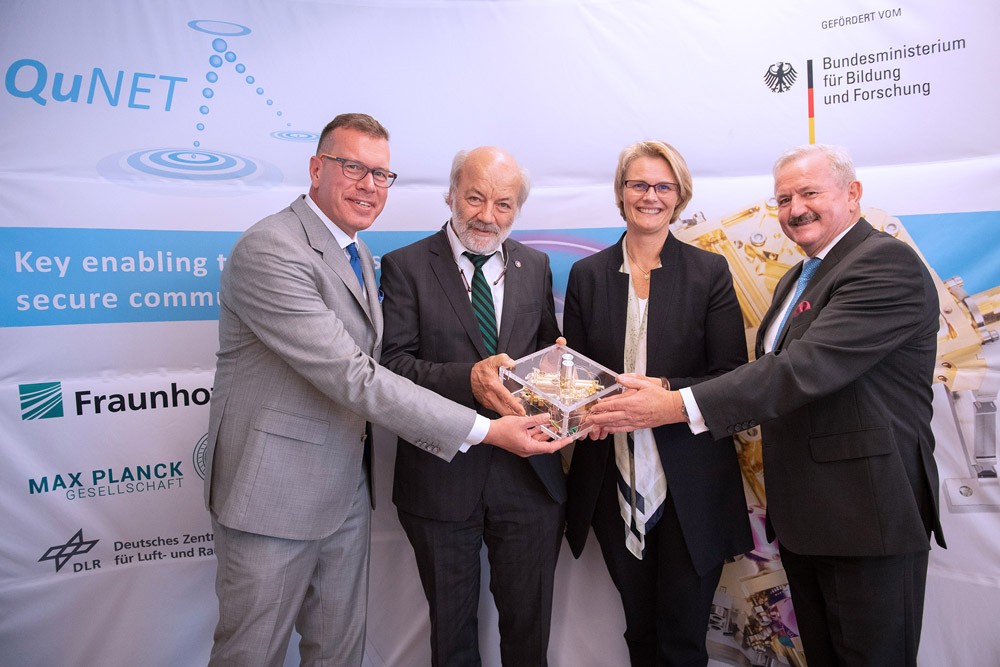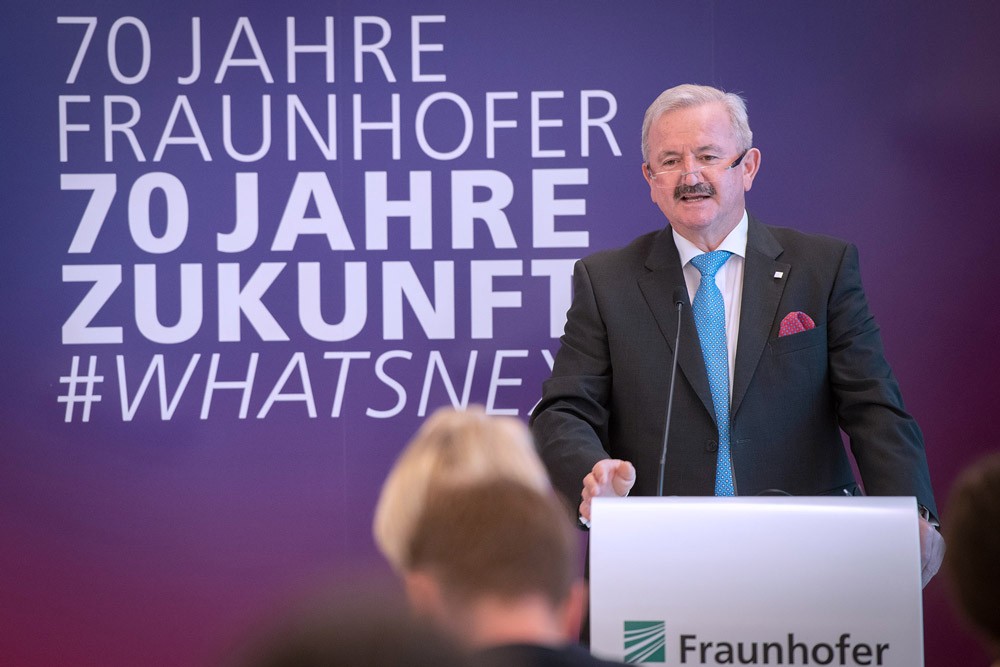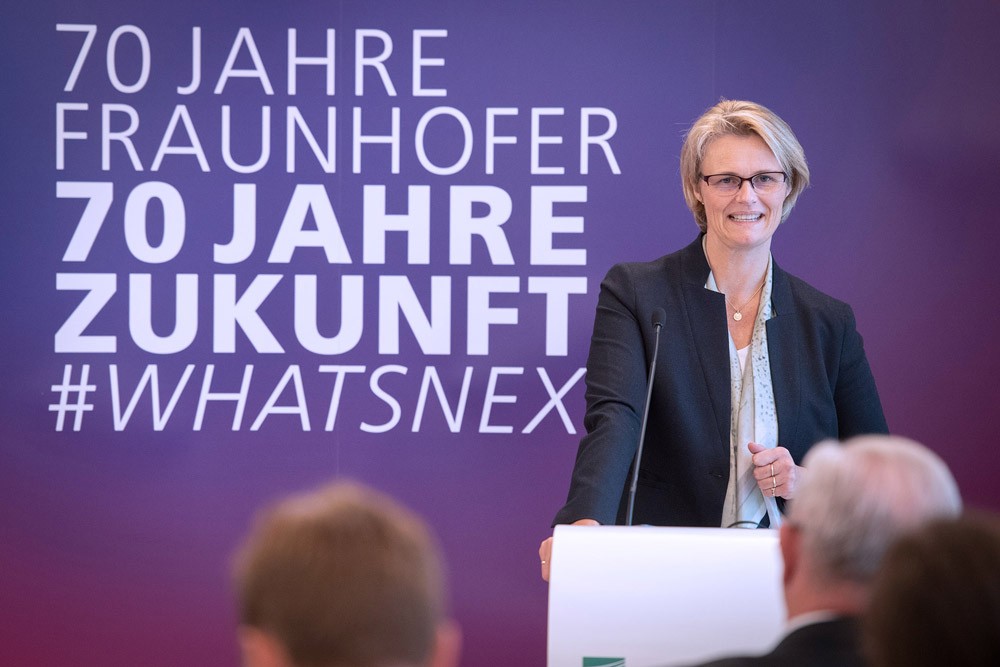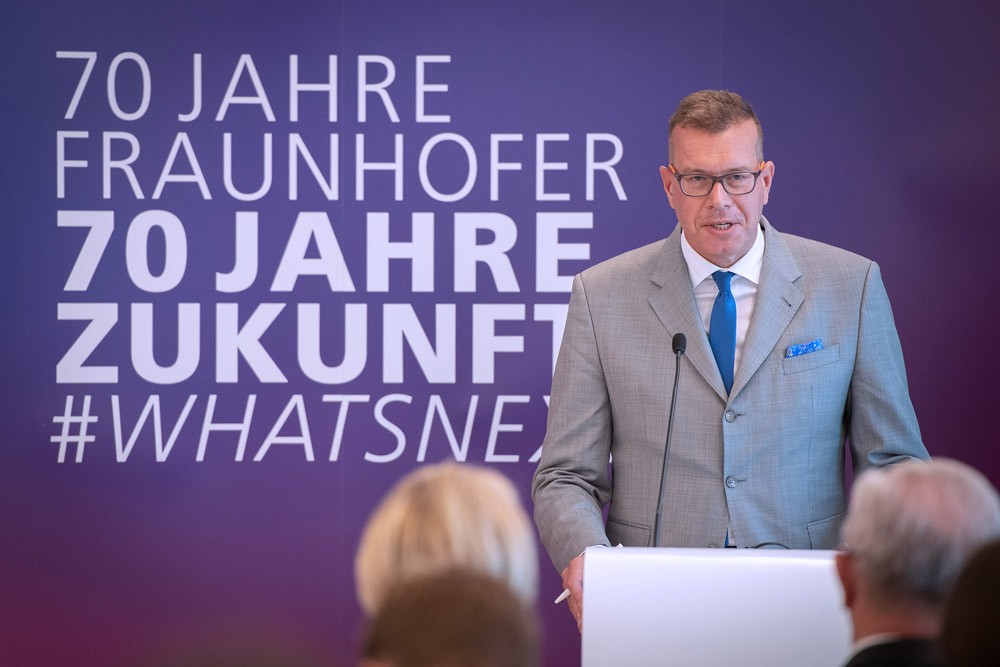Kick-off in Jena: BMBF initiative QuNET for tap-proof quantum communication
QuNET project launches at Fraunhofer IOF, builds secure quantum communication network for Germany and strengthens digital security and sovereignty.
On 12 November 2019, around 30 project participants met at the Fraunhofer IOF in Jena for the launch of QuNET. As part of the BMBF-funded initiative, the Fraunhofer-Gesellschaft, the Max Planck Society and the German Aerospace Centre will set up a pilot network for quantum communication in Germany, which will be used for tap-proof and tamper-proof data transmission.
At the start of the project, Federal Research Minister Anja Karliczek explained in a video message: »We must secure our information and communication systems as far as possible against IT attacks. Only then can the economy and society make full use of the progress and opportunities offered by digitalisation. That is why the development of a quantum communication infrastructure is crucial for us. This will enable greater security and technological sovereignty. Germany and Europe should become the most trustworthy data space in the world. QuNET’s work will bring us a great deal closer to this goal.«
Motivation
Secure communication networks are a critical infrastructure in modern information societies. Cyberattacks and data leaks are currently on the rise, affecting not only the economy but also citizens, public institutions and federal authorities. In addition, the latest technological advances in the development of quantum computers require new ways of transmitting data. These future high-performance computers will be able to break important cryptographic procedures of our current digital communication and thus jeopardise secure data traffic.
Quantum communication, on the other hand, will make it possible to counter this threat and transmit sensitive information in such a way that its confidentiality is maintained. Quantum states are used to distribute cryptographic keys that cannot be copied, read or even manipulated due to fundamental laws of quantum physics.
Prof Andreas Tünnermann, Director of Fraunhofer IOF, said in his opening speech: »Data security is a fundamental right and within the framework of QuNet we will endeavour to contribute to secure communication, but also to the secure storage of data in Germany and Europe. This infrastructure will be of interest to both science and industry.«
Project start and set goals
On the occasion of the project launch of the QuNET funding initiative, representatives of all participating institutions came together in Jena to discuss the next steps and adopt concrete work packages. In the first phase (QuNET-alpha), the researchers will investigate quantum communication technologies for hybrid communication systems and establish a quantum-secured pilot link between federal institutions.
In further project phases, the initiative aims to establish connectivity with other European quantum network initiatives. In close cooperation with German industry and the Federal Office for Information Security (BSI), QuNET will implement a German quantum communication infrastructure. QuNET is thus laying important foundations for quantum-secure communication, which in future will offer security in the digital world not only to federal authorities but also to industry and citizens.
The role of the Fraunhofer IOF
Fraunhofer IOF is coordinating the ‘QuNet’ project and is contributing its expertise in the fields of optical quantum technologies, precision mechanical systems and adaptive optics, among others. In addition to a mobile open science platform (QuBus) and free-beam experiments on quantum key distribution, colleagues in Jena are also working on new high-performance sources for photon pairs, for example. The guests were able to gain an insight into the relevant sub-projects during a tour of the laboratory.
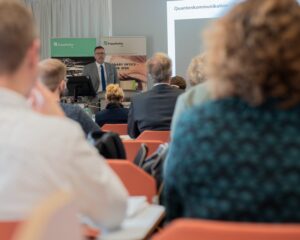
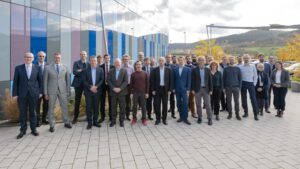
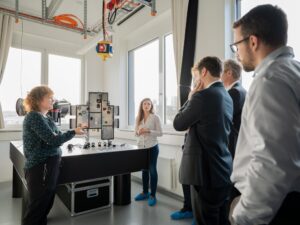
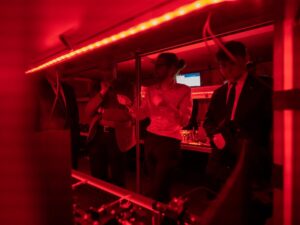
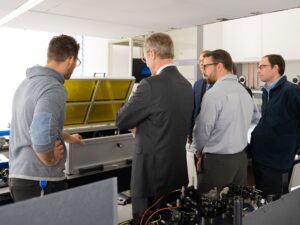
BMBF and research launch major offensive for quantum communication
The German government intends to massively increase its support in the field of optical quantum communication in the coming years. At a press conference at the Fraunhofer Forum in Berlin today, Federal Research Minister Anja Karliczek announced the official launch of the new ‘QuNET’ large-scale offensive. In future, intensive research will be carried out here on photonic technologies for tap-proof quantum-based communication networks. The consortium project is being led by the Fraunhofer Institute for Applied Optics and Precision Engineering IOF.
Together with the Fraunhofer-Gesellschaft, the Max Planck Society and the German Aerospace Centre, the Federal Ministry of Education and Research (BMBF) is planning a major initiative for a tap-proof quantum network. At a press conference at the Fraunhofer Forum in Berlin today, the Federal Minister of Education and Research, Anja Karliczek, announced the funding of the ‘QuNET’ initiative. With an initial funding volume of 25 million euros, research will be conducted in the coming years into how the laws of quantum physics can be utilised for secure communication networks.
Minister Anja Karliczek presented the BMBF’s plans: ‘In the digital age, the economy and society are more dependent than ever on secure communication. Secure data lines are the lifelines of our age. That is why data exchange must be made as secure as possible. Quantum communication offers unique opportunities for this. Germany and Europe must develop their own expertise in this area to avoid becoming dependent on others. That is why we must advance research in this future field. Germany and Europe should become the most trustworthy data space in the world – that is why I will put this topic on the German and European agenda. With the ‘QuNET’ initiative, top German research and companies are jointly laying the foundations for the secure communication of the future. I am grateful to the participants in this unique project for their commitment to this future field.” The aim of ‘QuNET’ is secure communication between government organisations. However, the seven-year project is also intended to serve as a central platform for the development of a German quantum communication infrastructure and will also lead the way in the development of a quantum internet. At European level, the German government and the ‘QuNET’ consortium partners are pursuing the goal of creating a secure European data space.
Challenges for quantum communication.
To meet this challenge, the Fraunhofer-Gesellschaft has joined forces with its Institutes of Applied Optics and Precision Engineering IOF (Jena) and Communications Engineering, Heinrich Hertz Institute HHI (Berlin) with the German Aerospace Centre and the Max Planck Institute for the Science of Light (Erlangen). Industrial partners from the fields of telecommunications, system and component development, security and satellite operations are also involved in the project, including companies such as Deutsche Telekom AG, ADVA Optical Networking and Tesat-Spacecom. The close links with national industry are intended to lay the foundations for the rapid transfer of the solutions developed in the ‘QuNET’ project.
Fraunhofer President Prof. Reimund Neugebauer explained the strategy of the Fraunhofer-Gesellschaft: ‘With “QuNET”, we are laying the foundation for the development of a standardised and secure European information and communication infrastructure alongside excellent partners from research, industry and politics. This project will enable us to further expand Germany’s pioneering role and technological leadership in this strategically important area. In the long term, we plan to combine data sovereignty and data security in the European data space at the highest level by linking quantum-based communication infrastructure with the International Data Spaces.”
New opportunities for the digital society
The background to the initiative is the increasing performance of digital technologies that affect today’s data networks and pose a growing threat to the security of our modern information society. Government organisations, banks and security-critical companies in particular need to rethink and renew their security infrastructures in this respect.
Prof. Andreas Tünnermann, Director of Fraunhofer IOF and initiator of the ‘QuNET’ project, explains: ‘The initiative synergistically combines the complementary expertise of high-ranking German research institutions in the field of quantum communication. The project strategically addresses the development of new heterogeneous quantum communication networks that will enable multi-user operation. QuNET will thus make an important contribution to physically secure communication in Germany and Europe.” Prof. Gerd Leuchs, Director Emeritus at the Max Planck Institute for the Science of Light, also referred to the technical potential of optical quantum communication: ‘The special property of quantum measurement that only ever reveals part, but never all, of the information available offers scope for interesting applications ranging from the perfect random number generator to the detection of unauthorised eavesdroppers. Both are important for secure communication.”
The project, which is divided into three phases, will officially start in autumn 2019: first, the researchers will develop the hardware components; in the second phase, they will work on the technological foundations for multi-user operation in heterogeneous networks. In the third phase, the public authority network based on quantum technology will be implemented together with industry and federal network operators.
